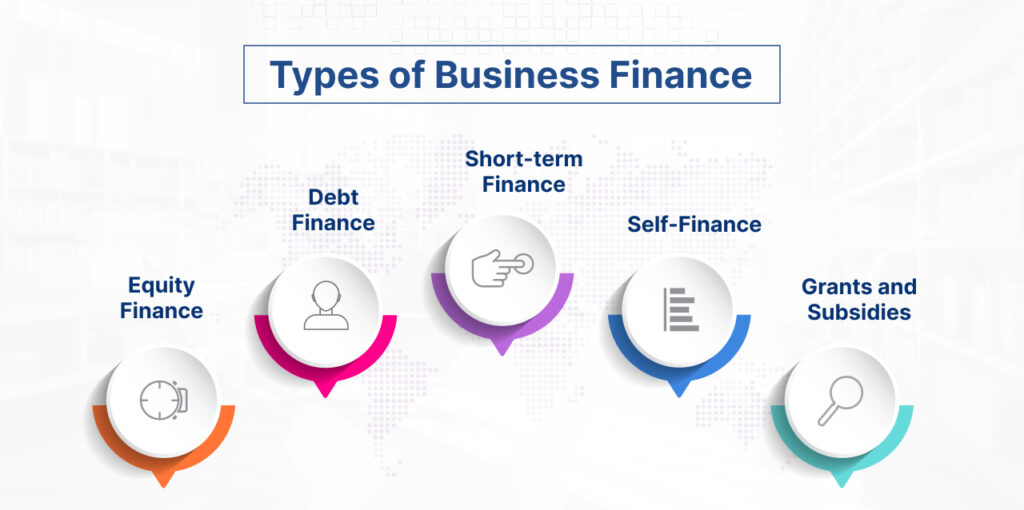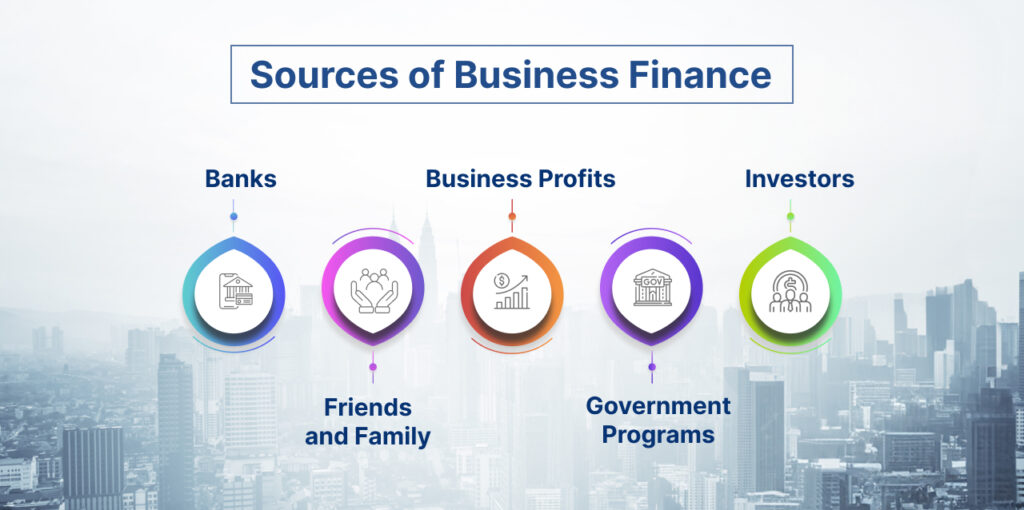Business Finance: Definition, Importance, Types and More
Hey there! Have you ever wondered how businesses manage all the money stuff? It’s like being the boss of your piggy bank but on a much bigger scale. Welcome to the world of business finance! Don’t worry if you still need to become a money whiz; we’re here to break it down for you in the easiest way possible. It is all about handling the dough (not the pizza kind, though that’s important, too).
Business finance is the secret sauce behind every successful company, from starting a business to running smoothly and making it grow big and strong.
So, grab a comfy seat and get ready to dive into the exciting business world. We promise it’s going to be a journey worth taking!
What is Business Finance?
It is the practice of financing a business. Like any other person, organisations also require managing money, though it could be on a large or small scale, depending on the type of business involved.
It is the management of funds for businesses, including how to raise funds and the proper utilisation, allocation, and control of such funds.
Business finance refers to the management and regulation of financial resources in a business to ensure the proper functioning of its business processes, the determination of funds required for specific activities, the accumulation of funds, and their allocation.
Importance of Business Finance
While you have an idea of what business financing is, let’s get to know more about its importance:
|
Category |
Description |
|
Starting a Business |
Startup funds are essential for buying equipment, leasing a location, and compensating employees at the initial stage of launching a business. |
|
Running Day-to-Day Operations |
Businessmen and businesswomen require capital to operate their businesses. This includes paying bills, purchasing business-related items, and paying employees’ wages. |
|
Growth and Expansion |
Growing businesses require more money to expand, open outlets, purchase machinery, or employ staff. Funds are crucial for a business’s financial needs. |
|
Unexpected Expenses |
Extra cash may be needed for equipment failure or business losses. Sufficient funds are a buffer against unexpected expenses, ensuring the business is hardly affected by surprises. |
|
Long-Term Success |
Organising the funding process is crucial for sustainable success. This includes developing long-term business strategies, securing its wealth, and averting future dangers. |
Types of Business Finance

It is worth noting that various finances exist for business organisations. Being familiar with these types assists a business in choosing which type suits its needs.
- Equity Finance: Refers to a process by which firms raise funds by selling ownership stakes in their businesses.Share purchasers are given a stake in the business; thus, share ownership means having a stake in it. Such finance does not come with repayment expectations; however, it implies an element of loss business controls.
- Debt Finance: This is another method where a business gets money by providing banking facilities. The business gets cash by agreeing to pay back a certain amount of cash plus interest. This may be in the form of bank loans, bonds, or other financial institutions.
- Self-Finance: Self-finance, also known as bootstrapping, is a process whereby a business’s operations are funded through the owner’s profit. This profit can be cash reserves, borrowing from friends or family, or operating profits.Self-finance means that no external financier or creditor can ask for collateral in return for funding, and the owner must not surrender ownership of the business; however, this may limit the amount of capital available to support expansion.
- Grants and Subsidies: Now and then, you get some funds from the government or other sources, which you have to repay in the future. They are often awarded for a particular project, be it a research project, product development project, or community project.
- Crowdfunding: A company occasionally gathers small funds from many people, generally from the internet. This idea of fundraising may occur when the organisation is unwilling to take a payday loan or sell ownership stakes.
Sources of Business Finance

Now, let’s look at where businesses can get this money from:
1. Banks: Banks are one of the standby sources of business funding. They provide credit facilities such as loans, lines of credit, and any other form of financial accommodation that a business can use to manage its funds.
However, funding availability normally depends on the bank’s credit status and feasible business plan, among other factors.
2. Investors: Some of the sources of finance that investors provide include equity finance. These can be individuals funding the venture individually (like angel funding) or organisations that fund the venture (like venture capital funding firms).
Businessmen unlock capital funds, to which investors contribute their cash, wanting to own stakes and a proportion of the profits.
3. Government Programs: Most governments have introduced various schemes that will assist financial aid companies in funding their businesses.
This may involve grants, loans, and subsidies. Such programs are usually targeted at particular types of undertakings or categories of beneficiaries.
4. Business Profits: The business can use profit to carry out the work and expand its operations. This is preferred in many cases because it requires no borrowing and does not entail selling off equity.
5. Friends and Family: There are opportunities to attract funds from friends and relatives at certain times. This can work well for small businesses or businesses with a recent start, but it is crucial to understand responsibilities, especially when they do not involve employment.
Important Concepts
1. Cash Flow Management: Cash flow is the money circulating in and out of the business. Proper cash flow management is vital to ensuring the adequate financing of business requirements, payments, and possible investments.
It is still imperative to state that capital management, particularly cash flow, can cause financial issues if a business is profitable.
2. Financial Planning and Forecasting: Saving, on the other hand, involves identifying what we want to achieve financially and how we will achieve it. Financial planning, therefore, integrates definite objectives to be financially met with blueprints of how those objectives are to be met.
3. Budgeting: It is also essential to prepare a budget strategy and adhere to it when it comes to spending so that the business does not overemphasise expenditures.
A budget aids the organisation by helping to plan and allocate the resources needed by the business and constrain undesirable expenditures. Budgeting forms a core element of business finance and ensures that the finances are on track.
4. Financial Statements: Knowing the meaning of revenue and expense statements, assets and liabilities, and cash receipts and payments is important for business financing.
These genuine business papers show how a business organisation is doing in its operations and finances. Interpreting these statements is crucial in formulating various financial strategies within business organisations.
5. Investment Analysis: Since it involves managing money for a business, the selection of an investment also presents a critical issue.
In this particular analysis, information about an investment and possible investment opportunities is assessed to evaluate its profitability and risk. This assists in developing scaling up in the right financial manner to meet their goals and objectives.
Conclusion
Business finance is essential for any business, big or small. It helps businesses start, operate, grow, and succeed. By understanding the different types and sources of financing a business. It can make better financial decisions and ensure their long-term success.
Business Finance: FAQs
Q1. What is business finance?
It refers to the department responsible for the overall control and management of funds and other financial processes in a business. This entails managing funds, including planning, controlling, saving, and future resource allocation, a.k.a. investing
Q2. Why is business finance important?
The concept of finance is essential as it aids businesses in many stages—from the establishment, running day-to-day operations, expansion, contingencies, or general growth and management for the best long-run results.
Q3. What are the types of business finance?
Some major types of finance are equity financiers, debt financiers, self-financers, grants/subsidies, and crowdfunding.
Q4. Where can businesses get finance from?
Business sources of finance include the availability of finance from banks, the sale of stock, government grants and loans, and profits from other businesses, friends, and families.
Q5. What is the difference between equity finance and debt finance?
Equity finance involves selling shares in a company, with the money gotten in return being used to finance the investment, while debt finance entails borrowing money, which has to be paid back with an additional cost known as interest.
Our Programs
Recent Blogs



- Amity University Online MBA
- Shoolini University Online MBA
- Sharda University Online MBA
- Uttaranchal University Online MBA
- Symbiosis Online MBA
- Jain University Online MBA
- Manipal Online MBA
- OP Jindal University Online MBA
- LPU Online MBA
- NMIMS Online MBA
- DY Patil Online MBA
- UPES University Online MBA
- IIM Kozhikode Online MBA
- MICA
Online MBA Specialisations
- Amity Online MCA
Online MCA Specializations
Copyright ©2025 All Rights Reserved by Hike Education Pvt. Ltd.











.png)

.png)




